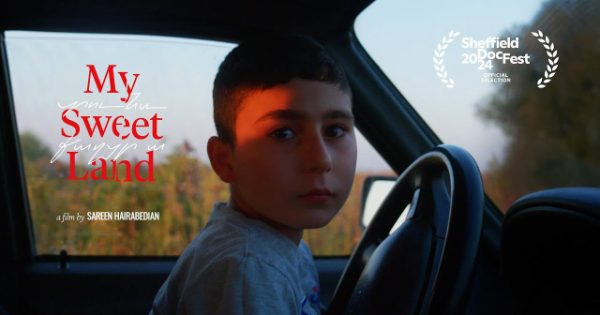
Sareen Hairabedian’s critically acclaimed, emotionally devastating film My Sweet Land is the story of a child named Vrej and his home in Artsakh, an unrecognised state bordered by Armenia and Azerbaijan. This heavily disputed home of ethnic Armenians has teetered in and out of war for over three decades. Although the Republic of Artsakh declared its independence after the collapse of the Soviet Union in 1991, Azerbaijan has repeatedly laid claim to the territory. This smudge in a world of conflict, a relative blind spot with little perceived “drama,” in the words of Hairabedian, was what the filmmaker sought to illuminate.
The film is intimate, pulling the watcher into a world of violet petals, pale green leaves and birthday candles. This way, Hairabedian makes the blast of a bomb seem close, personal, and dangerous, throwing the viewer into the surprise of violence.
Just eleven years old at the beginning of the film, Vrej declares, “we live in a country where war is expected to start at any moment—my father has lived through two wars, my grandmother, three.” The viewer is forced to empathize with a child speaking eloquently and calmly in the face of harrowing calamity. As we grow closer to Vrej, we feel a visceral pain watching children playing games of war, shooting fake guns out of abandoned bathtubs and learning to wear gas masks.
Hairabedian grew up in Jordan, a great-grandchild of Armenian genocide survivors, and pursued this project as a way to understand her own questions surrounding identity, home and belonging as she faced general trauma. During one of Vrej’s classes, elementary-aged students are asked to “prove to me that we exist as a country” by an instructor, a question that the viewer could hardly imagine being asked, much less how they would answer. One child responds, “because we are here.”
The film follows Vrej and his family as they live through peace and conflict. When Azerbaijan launched a new attack on Artsakh in 2020, Vrej’s family fled his homeland. He was displaced to Armenia with his family, but soon returned to Artsakh. When Azerbaijan invaded Artsakh again in 2023, Vrej and his family were forced to move to Armenia once again. They have lived in Armenia as refugees ever since. Through the lens of Hairabedian’s camera, this history is brought close to the viewer, as Hairabedian spent so much time with Vrej’s family that she became, as she described, “like a piece of furniture in their house,” filming over 500 hours of footage that was condensed into just an hour and a half. She chose to film Vrej’s birthday every year, and the final scene of the film is of him climbing a hill just after blowing out the candles on his cake in 2022. He remarks, “maybe by the time I grow up, lost lands will be ours again.”
As with many of the best stories, Hairabedian’s film is controversial. In 2024, My Sweet Land was withdrawn as Jordan’s entry for Best International Feature at the Academy Awards due to pressure from Azerbaijan. Hairabedian pivoted, instead entering the film for Best Documentary Feature rather than submitting to duress. This past April, UC Berkeley was slated to show My Sweet Land, but the screening was cancelled due to pressure from Azerbaijan. However, due to the activism of students and Berkeley community members, the film was shown this past Thursday.
The Hamilton audience was drawn into the story of this young, wise, aspiring dentist this past Sunday as part of the F.I.L.M. series. The film is somewhere between a documentary and an indie flick, authentic and factual but not observational or removed in any sense. A story of many children told through one, My Sweet Land elicits emotion as it initiates discussion and improves awareness of Artsakh’s struggle to exist in peace.